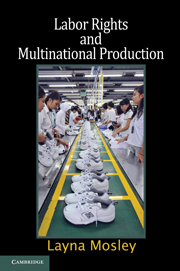Book contents
- Frontmatter
- Contents
- Tables and Figures
- Acknowledgments
- 1 Workers in the Global Economy
- 2 Producing Globally
- 3 Inside and Out
- 4 Conceptualizing Workers’ Rights
- 5 The Overall Picture
- 6 Varieties of Capitalists?
- 7 Labor Rights, Economic Development, and Domestic Politics
- 8 Conclusions and Issues for the Future
- Appendix Data and Coding
- References
- Index
7 - Labor Rights, Economic Development, and Domestic Politics
A Case Study
Published online by Cambridge University Press: 05 June 2012
- Frontmatter
- Contents
- Tables and Figures
- Acknowledgments
- 1 Workers in the Global Economy
- 2 Producing Globally
- 3 Inside and Out
- 4 Conceptualizing Workers’ Rights
- 5 The Overall Picture
- 6 Varieties of Capitalists?
- 7 Labor Rights, Economic Development, and Domestic Politics
- 8 Conclusions and Issues for the Future
- Appendix Data and Coding
- References
- Index
Summary
The systematic, cross-national assessment of collective labor rights outcomes, and their causal determinants, is the central aim of this book. As such, much of the evidence presented is quantitative in nature, and it is cast at the country level of analysis. Whereas I discuss the importance of domestic economic and political variables as independent and intervening variables in Chapters 3 and 5, the explanations advanced focus on the impact (or lack thereof) of the global economy on national-level labor rights outcomes. Yet, despite the need (both from the point of view of international political economy and that of economic policymakers) for systematic, large-N treatments of the linkages between global production and labor rights, such an analytical approach also has limitations. Some of these are identified in the preceding chapter, which highlights problems of data availability among low- and middle-income nations.
Another drawback relates to the difficulty of gaining a sense of the longer-term (and often domestically driven) processes linking the global economy, domestic politics and institutions, and the rights of workers. Such causal processes often unfold over many years, and they may unfold in a path-dependent fashion. This longer-term dynamic process may relate to the hypotheses introduced in Chapter 3 as well as to the sector and source arguments discussed in the previous chapter. As the nature of a country’s engagement in global production networks changes (in terms of the extent of its involvement, the sectors in which it is involved, or the developed nations from which investment and subcontracting come), labor rights outcomes also should change. Such changes, though, may happen over several years or even decades, making their impact easier to trace in qualitative analyses. Qualitative analyses not only facilitate the consideration of longer-term processes; they also allow for the possibility of unit heterogeneity (Sambanis 2004). That is, the medium- and longer-term processes linking labor rights, domestic politics, and the global economy may vary across units. Given these considerations, it is useful to complement quantitatively based approaches to understanding collective labor rights with qualitative analyses, either by industry (i.e., Silver 2003) or by country and region (i.e., Murillo 2001). By investigating a single case or set of cases over a longer period of time, we can assess the ways in which external variables (here, multinational production) are linked with outcome variables (labor rights) via various domestic political and economic institutions.
- Type
- Chapter
- Information
- Labor Rights and Multinational Production , pp. 210 - 236Publisher: Cambridge University PressPrint publication year: 2010



